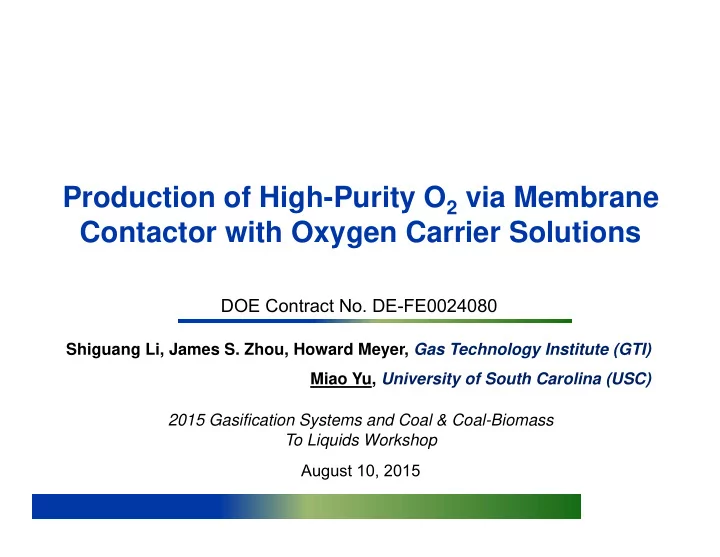

Production of High-Purity O 2 via Membrane Contactor with Oxygen Carrier Solutions DOE Contract No. DE-FE0024080 Shiguang Li, James S. Zhou, Howard Meyer, Gas Technology Institute (GTI) Miao Yu, University of South Carolina (USC) 2015 Gasification Systems and Coal & Coal-Biomass To Liquids Workshop August 10, 2015
Key personnel Not-for-profit research company, providing energy and natural gas solutions to the industry since 1941 Facilities : 18 acre campus near Chicago, 28 specialized labs Dr. James Zhou Mr. Howard Meyer PI: Dr. Shiguang Li Co-educational research university located in Columbia, South Carolina Prof. Yu Group : expertise in thin films, coatings, membranes, liquid absorption and transport mechanisms co-PI: Dr. Miao Yu Dr. Mahdi Fathizadeh 2
Our inspiration…Red Blood Cell We use membrane contactor to realize our concept 3
What is a membrane contactor? High surface area membrane device that facilitates mass transfer Gas on one side, liquid on other side Membrane does not wet out in contact with liquid Separation mechanism : O 2 permeates through membrane, reacts with the solvent; N 2 does not react and has low solubility in solvent 4
Process description 5
Application in the Integrated Gasification Combined Cycles (IGCC)
Project objective and goal Objective : achieve proof of concept using hollow fiber membrane contactor (HFMC) with an O 2 carrier solution as solvent and air as feed to produce greater than 95% purity of O 2 Goal: achieve O 2 production rate with a mass transfer coefficient ≥ 1.0 (sec) -1 and O 2 purity ≥ 95% Membrane contactor vs. conventional contactors Volumetric mass transfer Gas ‐ liquid contactor Coefficient ((sec) -1 ) 0.0004 – 0.07 Packed column (Countercurrent) 0.003 – 0.04 Bubble column (Agitated) 0.0007 – 0.075 Spray column Our goal for membrane contactor 1.0 7
Our current progress PEI-Co = poly(ethyleneimine)-cobalt Loading on Solubility in Total oxygen carrier, water, ml capacity, ml ml (STP)/L (STP)/L (STP)/L Product O 2 solution solution solution purity, % N 2 O 2 N 2 O 2 N 2 O 2 0 2.9 5.3 1,003 5.3 1,000 99.5 14 120 Absorbed O 2 volume (ml) 12 100 PEI/Co ratio mL O 2 /L solution 10 O 2 pressure (Torr) 80 20 590 8 15 780 60 6 10 1,100 40 4 7.5 1,300 Pure O 2 absorption rate at 20 2 PEI/Co ratio of 10 5 1,500 0 0 0 100 200 300 400 500 Time (min) 8
Stage of the current project and beyond the project Current project We are developing a promising O 2 production process using HFMC with O 2 carrier solution O 2 carrier solution developed and showed high O 2 absorption capacity >95% purity of O 2 production proof of concept in progress Techno-economic analysis (TEA) based on experimental data Beyond the project PEI-Co solution optimization: longer lifetime, fast bonding and desorption kinetics, desired physical properties, etc. HFMC operation condition optimization towards high production rate Continuous >95% O 2 production in HFMC 9
PEEK membrane under development Membrane Packing density O 2 permeance (m 2 /m 3 ) geometry (GPU) 2,200 1,000 Hollow fiber 10
Mature air separation technologies and comparison O 2 purity limit Largest O 2 flow rate Technology (vol.%) (Ton O 2 /day) Cryogenic distillation 99+ >3,000 Pressure swing adsorption (PSA) 95 <350 Conventional gas separation 40 <20 membranes Advantages of our technology compared to cryogenic distillation Capital Equipment Savings Operating Cost Savings Compression to operating conditions only Simple materials of construction for O 2 fraction of air Reduction in compression and heat Near ambient temperature and pressure exchange equipment Low binding energy for O 2 solvent Near atmospheric pressure operations Estimated O 2 purity >95% Projected cost including capital, operating, and energy use is ~ $19.97/ton O 2 , lower than cryogenic distillation (~ $35.80/ton O 2 ) Can be easily scaled 11
Acknowledgements Financial support DOE NETL Darryl T. Shockley 12
Recommend
More recommend